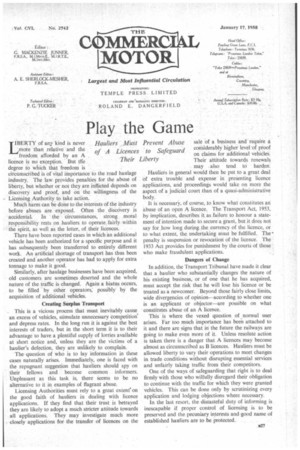Play. the Game
Page 35

If you've noticed an error in this article please click here to report it so we can fix it.
LBERTY of any kind is never more than relative and the freedom afforded by an A licence is no exception. But tffe degree to which that freedom is circumscribed is of vital importance to the road haulage industry. The law provides penalties for the abuse of liberty, but whether or not they are inflicted depends on discovery and proof, and on the willingness of the Licensing Authority to take action.
Much harm can be done to the interests of the industry before abuses are exposed. Often the disctivery is accidental. In the circumstances, strong moral responsibility, rests on hauliers to operate fairly within the spirit, as well as the letter, of their licences.
There have been reported cases in which an additional vehicle has been authorized for a specific purpose and it has subsequently been transferred to entirely different worlc. An artificial shortage of transport has thus been created and another operator has had to apply for extra tonnage to make it good.
Similarly, after haulage businesses have been acquired, old customers are sometimes deserted and the whole nature of the traffic is changed. Again a hiatus occurs, to be filled by other operators; possibly by the acquisition of additional vehicles.
Creating Surplus Transport This is a vicious process that must inevitably cause an excess of vehicles, stimulate unnecessary competition' and depress rates. In the long run it is against the best interests of traders, but in the short term it is to their advantage to have a plentiful supply of lorries available at short notice and, unless they are the victims of a haulier's defection, they are unlikely to complain.
The question of who is to lay information in these cases naturally arises. Immediately, one is faced with the repugnant suggestion that hauliers should spy on their fellows and become common informers. Unpleasant as this task is, there Seems to be no alternative to it in examples of flagrant abuse.
Licensing Authorities must rely to a great extent` on the good faith of hauliers in dealing with licence applications. If they find that their trust is betrayed they are likely to adopt a much stricter attitude towards all applications. They may investigate much more closely applications for the transfer of licences on the sale of a business and require A considerably higher level of proof on claims for additional vehicles'. Their attitude towards renewals may also tend to harden.
Hauliers in general would then be put to a great deal of extra trouble and expense in presenting licence applications, and proceedings would take on more the aspect of a judicial court than of a quasi-administrative body.
It is necessary., of course, to know what constitutes an abuse of an open A licence. The Transport Act, 1953, by implication, describes it as failure to honour a statement of intention made to secure a grant, but it does not say for how long during the currency of the licence, or to what extent, the undertaking must be fulfilled. The • penalty is suspension or revocation of the licence. The 1933 Act provides for punishment by the courts of those who make fraudulent application& Dangers of Change In addition, the Transport Tribunal have made it clear that a haulier who substantially changes the nature of his existing business, or of one that he has acquired, must accept the risk that he will lose his licence or be treated as a newcomer. Beyond those fairly close limits, wide divergencies of opinion—according to whether one is an applicant or objector—are possible on what constitutes abuse of an A licence.
This is where the vexed question of _normal user arises. Far too much importance has been attached to it and there are signs that in the future the railways are going to make even more of it. Unless resolute action is taken there is a danger that A licences may become almost as circumscribed as B licences. Hauliers must be allowed liberty to vary their operations to meet changes in trade conditions without disrupting essential services and unfairly taking traffic from their competitors.
One of the ways of safeguarding that right is to deal firmly with those who wilfully disregard their obligation to continue with the traffic for which they were granted vehicles. This can be done only by scrutinizing every application and lodging objections where necessary.
In the last resort, the distasteful duty of informing is inescapable if proper control of licensing is to be preserved and the pecuniary interests and good name of established hauliers are to be protected.
















































































































